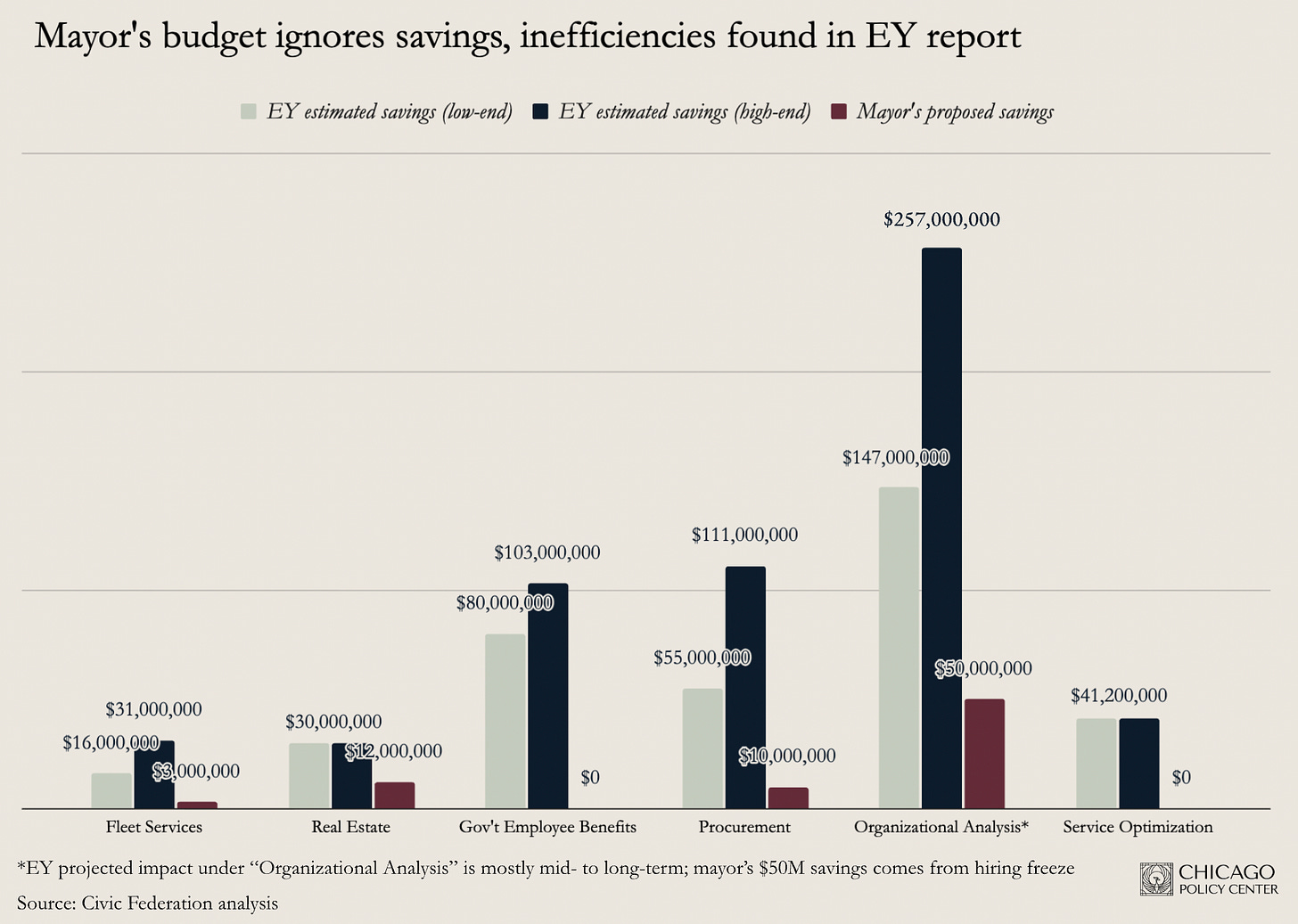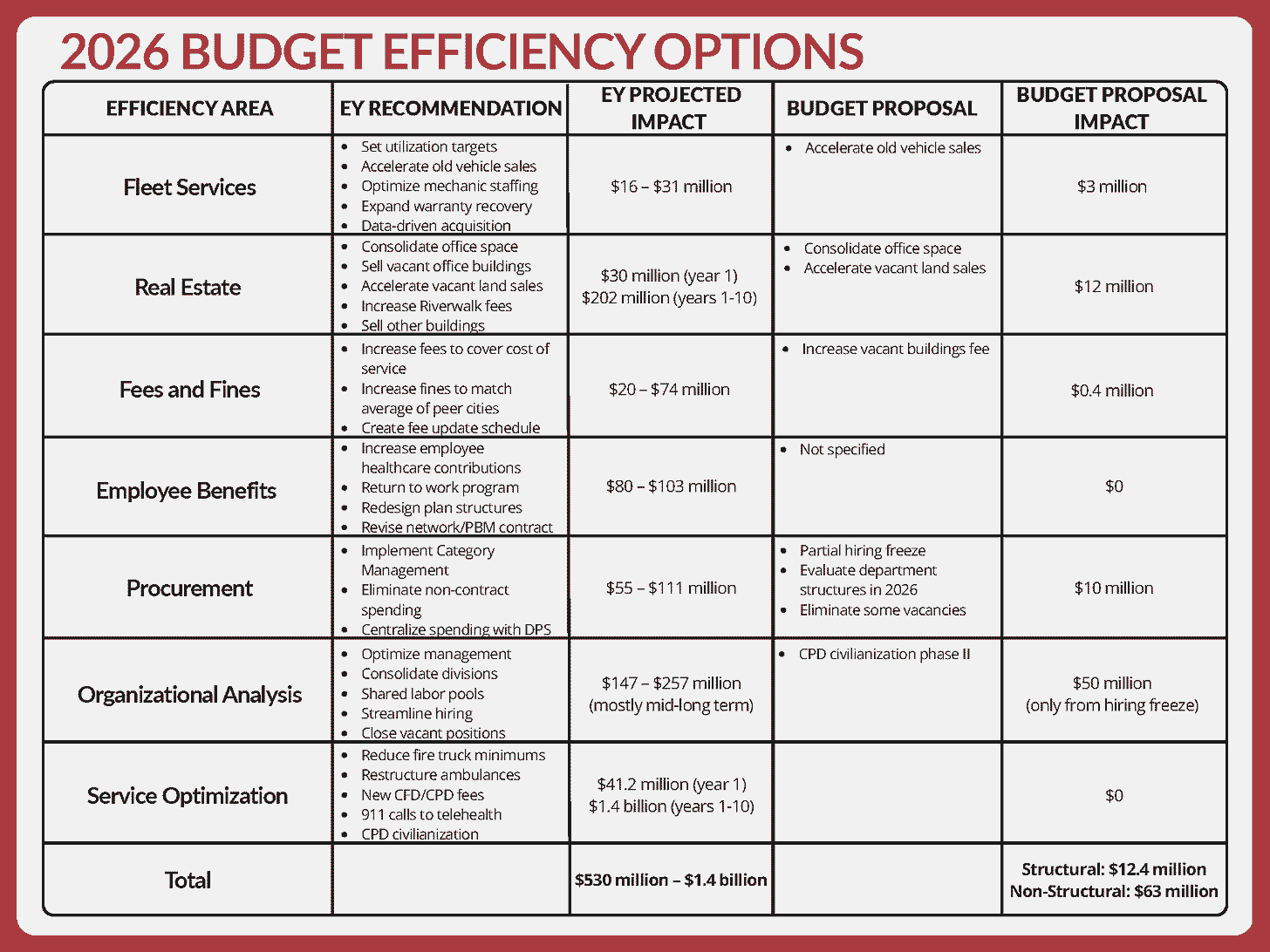Johnson's budget ignores $1B in potential savings, here's what City Council should do about it
When it comes to the city budget, Chicago City Council has never been in the driver’s seat. Aldermen aren’t riding shotgun, either.
Council is typically blindfolded, told to keep quiet, and ushered into the trunk.
But this budget season is different.
The city is staring down a projected $1.2 billion deficit, which Mayor Brandon Johnson has proposed closing with a bevy of tax increases, including a controversial “head tax” that is especially concerning given the city’s anemic economic growth.
A majority of council members last week signed a letter not only opposing the head tax, but also calling for a special meeting to question consultants from EY (formerly Ernst & Young) about their taxpayer-funded report identifying $1.4 billion in city government efficiencies.1
The letter also called on the mayor to avoid borrowing for operational spending, a horrible practice cited by S&P this week in cutting the city’s credit outlook to negative.2
What happens next?
Let’s get into it.
Council gaining confidence
The EY hearing is scheduled for tomorrow: Monday, Nov. 10. This simple act of questioning EY (or the mayor) in a formal setting is a welcome development, because Chicago’s City Council is not equipped to be a true legislative branch. Consider:
The council’s Office of Financial Analysis is woefully understaffed, with just four employees on hand to analyze the mayor’s $16.6 billion budget.
Committee chairs are chosen by the mayor, who also presides directly over the council in meetings.
The mayor fills council vacancies.
The council cannot introduce its own, alternative budget.
This lack of independence comes from Chicago’s lack of a city charter, which is a constitution for local governments. Chicago is the only major city in the country without this governing document.3
But short of a charter, the council still wields the power of the pulpit. And members should use it to their full advantage this week.
Here are the questions members must ask, on behalf of their constituents.
Questions for EY
Council members should take EY’s testimony as an opportunity to enrich their understanding of what’s truly possible to make city government work more efficiently.
In advance of the hearing, the Civic Federation published a great analysis comparing EY’s recommendations to the mayor’s budget proposal. It revealed that despite EY identifying $1.4 billion in potential savings, Johnson’s budget contains just $12 million in structural savings, plus a hiring freeze that will save an estimated $50 million.
The breakdown for each budget category shows the mayor largely ignored EY’s recommendations.
Here are three questions that City Council should ask EY tomorrow:
What limitations did the mayor’s office place on the scope of your efficiency recommendations?
What specific expectations did the mayor’s office communicate to your team regarding potential efficiencies from changes in employee benefits?
In explaining the paltry $12 million in structural savings put forth in their proposed budget, the mayor’s office claimed many of your recommendations cannot be implemented in time to see savings in the upcoming budget year. Which of your efficiency recommendations could be implemented by mid-year, allowing the mayor’s team six months to prepare? And what is the total estimated impact of those efficiencies?
Questions for the mayor’s budget team
Following the EY hearing, Council members deserve further answers from the mayor’s team: Chief Financial Officer Jill Jaworski, Budget Director Annette Guzman, and Comptroller Michael Belsky. Here are five questions Council members should ask the mayor’s team:
Why does your budget contain just $12 million in structural savings when your consultant produced a high-range estimate of $1.4 billion in potential savings?
For each cost-saving recommendation identified in the Employee Benefits category: Did the mayor’s team approach labor with this specific cost-saving recommendation? What was the response?
Mayor Brandon Johnson and the Chicago Teachers Union are claiming that a “no” vote on this budget will cause cuts to schools. Beyond a declared TIF surplus yielding $379 million for Chicago Public Schools, what is the impact of this budget on schools?
If more taxes are needed for schools, why is the mayor making CPS return TIF money to the city to help the city balance its budget?4
Johnson has framed this budget proposal as protecting the city from federal cuts. What is the total estimated impact of federal budget changes on Chicago’s municipal budget this year?
In the news
Jim Dey at the Champaign News-Gazette highlighted Chicago Policy Center testimony in Springfield on changing the timing of municipal elections. Chicago is the only major city in the country to hold its municipal elections in February of odd years.
Testifying Sept. 24 before a state House committee, Chicago Policy Center executive director Austin Berg noted voter turnout in off-year elections is not just low in Cook County but in all of Illinois’ 102 counties.
He said that “in Effingham County,” municipal election turnout “for the last three elections has been 16 percent, 14 percent and 13 percent” while St. Clair County had “16% turnout or less in the last four election cycles running.”
The April voter turnout in Champaign County was 18.4 percent.
“Entire cities are making major decisions about schools, property taxes, and local government with very few residents actually participating. That is not how a healthy democracy functions,” he said.
Berg cited a “simple” solution used elsewhere, shifting off-year local elections to even-year November elections.
Democratic state Rep. Maurice West of Rockford, chairman of the House elections committee, presided over the hearing …
Numbers show Chicago’s average November presidential turnout is 61.4 percent, far more than the average turnout of 36.4 percent in municipal elections during the past decade.
After seeing numbers Berg cited, a Chicago alderman proposed a resolution asking the legislature to align Chicago’s mayoral election with the presidential election.
Bond Buyer reported on S&P cutting Chicago’s credit outlook to negative:
The hearing called by the City Council is a significant step forward and shows it recognizes the need to be a coequal player, [Civic Federation President Joe] Ferguson said. But he also flagged the city’s lack of a municipal constitution that balances power and provides necessary structure, saying it is “fundamental to how we got into this situation and how we need to get out of it.”
I joined the Mincing Rascals podcast on WGN to discuss last week’s election results, Operation Midway Blitz, and Rep. Chuy Garcia’s last-minute move to exit his congressional race. Listen here. My “green light” recommendations: Superfly Records (Paris) and the Dusty Groove (Wicker Park).
Ald. Walter “Red” Burnett, who was appointed by the mayor, later removed his name from the letter.
While allowing a true, voter-approved city charter for Chicago will ultimately require a change in state law, it is notable that 24 of 50 aldermen have signed on to pro-charter resolutions this year.
This is a reference to Johnson demanding the schools pay the city $175 million to cover an MEABF pension payment that CPS is not legally obligated to pay.




